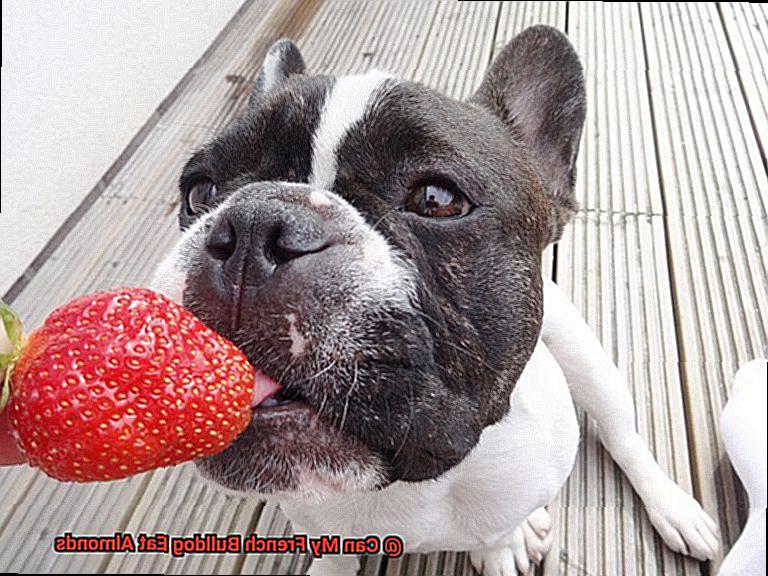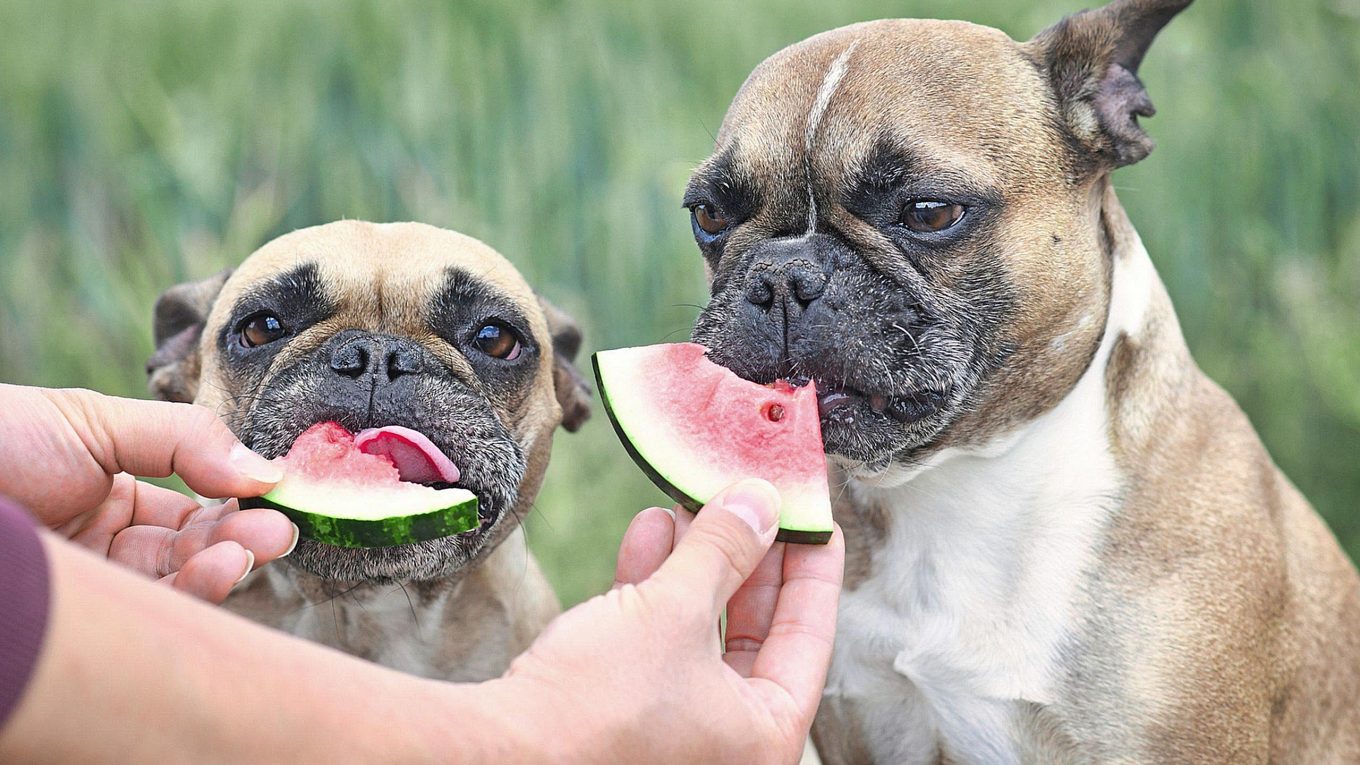Can My French Bulldog Eat Almonds?
Today, we’re going to delve into the tantalizing world of almonds and whether our furry friends can partake in this nutty delight. As responsible pet parents, it’s crucial to know which foods are safe and nourishing for our beloved pups.
Almonds may be a scrumptious and wholesome snack for us humans, but what about our Frenchies? In this blog post, we’ll uncover the potential perks of almonds, the possible pitfalls, and what makes for a healthy almond diet for our charming bat-eared companions.
So, let’s dig in and discover if almonds are a yay or nay for our French bulldogs.
Understanding the Nutritional Needs of French Bulldogs
Contents
- 1 Understanding the Nutritional Needs of French Bulldogs
- 2 The Potential Risks of Feeding Almonds to French Bulldogs
- 3 Are Almonds Safe for French Bulldogs?
- 4 The Benefits of Feeding Almonds to Your Dog
- 5 Choking Hazards of Almond Consumption in Dogs
- 6 High-Fat Content in Almonds and Its Impact on Digestive Health in Dogs
- 7 Amygdalin Compound Found in Almonds and Its Effect on Dogs
- 8 What To Do If Your French Bulldog Accidentally Eats Almonds
- 9 Conclusion
French Bulldogs are adorable and unique pets that require special care, including a balanced and nutritious diet. In this article, we will explore the nutritional needs of French Bulldogs and how they differ from other breeds of dogs. Let’s dive in.
Unique Body Structure and Health Concerns
French Bulldogs have a stocky build and a brachycephalic (short-nosed) face, which makes them prone to certain health issues such as obesity, allergies, and respiratory problems. Therefore, it becomes even more important to pay attention to their nutrition to prevent any potential health complications.
Factors Affecting Nutritional Needs
The nutritional needs of French Bulldogs are primarily determined by factors such as age, weight, activity level, and overall health condition. Puppies require a higher amount of nutrients compared to adult dogs as they are in the growing phase. Similarly, French Bulldogs with a higher activity level will need more calories to support their energy expenditure.
Essential Nutrients
- Proteins: Good quality animal-based proteins such as chicken, turkey, or fish should form the basis of their diet. It is important to avoid protein sources that may trigger allergies or sensitivities in French Bulldogs.
- Fats: Healthy fats from sources like fish oil or olive oil help in maintaining healthy skin and coat. Avoid unhealthy saturated fats.
- Carbohydrates: Complex carbohydrates like sweet potatoes or brown rice are preferable over simple carbohydrates to prevent weight gain.
- Vitamins and Minerals: A well-balanced diet that includes a variety of fruits and vegetables can provide necessary vitamins and minerals.
Can French Bulldogs Eat Almonds?
No, it is not recommended to feed almonds to your French Bulldog. Almonds are small and hard, posing a choking hazard for them. Additionally, almonds are high in fat and can cause digestive issues like diarrhea or pancreatitis in French Bulldogs. Moreover, almonds contain a compound called amygdalin, which can break down into cyanide when ingested and can be toxic to dogs, especially in large quantities.
Understanding the nutritional needs of French Bulldogs is crucial for their overall health and well-being. While they require a balanced diet like any other dog breed, it’s important to consider their unique body structure and health concerns.
Avoid feeding them high-fat foods like almonds and stick to a balanced and appropriate diet to ensure their good health. Always consult with a veterinarian for specific dietary recommendations for your French Bulldog.
The Potential Risks of Feeding Almonds to French Bulldogs
It’s crucial to be aware of potential risks when it comes to their nutrition. French Bulldogs, with their sensitive digestive systems and unique health concerns, require special attention when it comes to their diet.
In this blog post, we’ll explore the potential risks associated with feeding almonds to French Bulldogs and provide valuable insights to help you keep your Frenchie safe and healthy.
Sensitive Digestive Systems:
French Bulldogs have sensitive tummies, and certain foods can trigger digestive issues. Almonds are high in fat and can contribute to obesity in French Bulldogs. Excessive fat consumption can lead to weight gain, joint problems, and even heart disease. It’s important to prioritize a balanced diet specifically formulated for French Bulldogs to maintain their optimal health.
Cyanide Poisoning:
Almonds contain cyanogenic glycosides, which can release cyanide when ingested. While the levels of cyanide in almonds are generally harmless to humans, dogs, including French Bulldogs, are more susceptible to this toxin. Cyanide poisoning can cause vomiting, diarrhea, difficulty breathing, tremors, seizures, and even be fatal in severe cases. Avoid any potential exposure by keeping almonds out of your Frenchie’s reach.
Choking Hazard:
Almonds are small and hard, posing a choking hazard for dogs with short snouts like French Bulldogs. Their compacted airways make them more prone to choking incidents. To prevent any mishaps, ensure that your Frenchie does not have access to almonds or any other small food items that could potentially obstruct their airway.
Intestinal Blockage:
Ingesting almonds whole or in large pieces can result in intestinal blockage for French Bulldogs. This can be a serious condition requiring immediate veterinary intervention, and in some cases, surgical removal of the blockage may be necessary. To avoid these risks, it’s best to keep almonds away from your Frenchie’s diet entirely.
Allergic Reactions:
Just like humans, some dogs may have allergies or sensitivities to certain foods, including almonds. Allergic reactions can manifest as itching, skin rashes, or gastrointestinal upset. If you suspect your Frenchie is experiencing any adverse reactions after consuming almonds, consult your veterinarian for guidance.
Additional Ingredients in Almond Products:
Almond-based products such as almond butter or almond milk may contain additional ingredients that can be harmful to dogs. For example, some almond butters may include xylitol, a sweetener that is toxic to dogs. Always read labels carefully and avoid sharing almond-based products with your Frenchie unless explicitly recommended by your veterinarian.
Are Almonds Safe for French Bulldogs?
When it comes to the safety of our furry friends, we need to tread carefully, especially when it comes to their diet. French Bulldogs, with their sensitive digestive systems, require extra caution when it comes to what they eat. While almonds may be a popular and nutritious snack for humans, they can pose potential risks for our beloved Frenchies.
The Danger of Cyanide
Almonds contain a substance called amygdalin, which breaks down into cyanide when ingested. Now, before you panic, let me assure you that the amount of cyanide in almonds is generally considered safe for humans. However, our furry friends are more susceptible to its toxic effects, especially in large quantities.
Symptoms of cyanide poisoning in dogs can include vomiting, diarrhea, difficulty breathing, and in severe cases, seizures or even death. It’s crucial to remember that not all French Bulldogs will react the same way to almonds. Some may be more sensitive than others. Even if your Frenchie doesn’t show immediate signs of distress after eating almonds, it doesn’t mean they are safe for them in the long run.
Prevention is Key

To ensure the well-being of your French Bulldog, it’s best to err on the side of caution and avoid feeding them almonds altogether. By doing so, you can prevent any potential health issues that may arise from almond consumption.
Accidental Ingestion
If your curious Frenchie happens to get their paws on a small amount of almonds, don’t panic just yet. It may not cause immediate harm. However, it’s essential to monitor their behavior closely and contact a veterinarian if any unusual symptoms occur. Better safe than sorry.
It’s All About Their Health
When it comes to our French Bulldogs’ health, we need to prioritize their well-being above all else. Avoiding almonds is a small sacrifice to make to keep our furry friends safe from potential harm. Remember, prevention is key, and consulting your veterinarian is always a wise decision when it comes to your Frenchie’s diet.

The Benefits of Feeding Almonds to Your Dog
French bulldogs are known for their adorable wrinkly faces and playful personalities. As responsible pet owners, we always strive to provide them with the best nutrition possible. While almonds may seem like a tasty snack to share with your furry friend, it is important to understand both the potential benefits and risks associated with feeding almonds to French bulldogs.
Potential Benefits:
- Healthy Fats: Almonds are a rich source of healthy fats, including omega-3 fatty acids. These fats play a crucial role in supporting your dog’s brain function and can also promote a shiny coat and healthy skin.
- Protein Power: Protein is an essential nutrient for muscle development and repair. Almonds are a good source of plant-based protein, making them a suitable addition to your active or growing French bulldog’s diet.
- Fiber for Digestive Health: Almonds contain fiber, which can help regulate digestion and prevent constipation in dogs. However, it is important to introduce almonds gradually to avoid digestive upset.
- Vitamins and Minerals: Almonds are packed with vitamins and minerals that can contribute to your dog’s overall health. Vitamin E acts as an antioxidant, supporting immune function, while minerals like magnesium and calcium promote strong bones and teeth.
Risks and Considerations:
- High Fat Content: While the healthy fats in almonds can benefit your French bulldog, it is crucial to feed them in moderation. Too many almonds can lead to weight gain and digestive issues.
- Allergic Reactions: Some dogs may be allergic to almonds or develop sensitivities over time. If you notice any signs of digestive upset or allergic reactions, such as vomiting, diarrhea, or itchiness, discontinue feeding almonds immediately and consult with your veterinarian.
- Avoid Flavored or Salted Almonds: Flavored or salted almonds often contain additives that can be harmful to dogs. Stick to plain, raw almonds as the safest option.
Choking Hazards of Almond Consumption in Dogs
Picture this: you’re enjoying a handful of crunchy almonds as a snack, and your adorable French bulldog is sitting nearby, eyes fixated on every move you make. You can’t help but wonder, can your furry friend partake in this delightful treat too? Well, before you toss a whole almond their way, let’s talk about the potential choking hazards that almonds can pose for French bulldogs.
French bulldogs are known for their unique snouts, which are shorter and flatter than those of other dog breeds. This adorable feature can unfortunately make it more difficult for them to chew and swallow certain foods, including almonds. The shape and size of whole almonds can be a real challenge for their little mouths, increasing the risk of choking.
Choking is no laughing matter, folks. It’s a serious medical emergency that requires immediate attention. If you notice your French bulldog gagging, coughing, having difficulty breathing, pawing at their mouth, or showing signs of panic, it’s crucial to act quickly. So how can we prevent such a scary situation from happening in the first place?
First and foremost, let’s avoid giving whole almonds to your French bulldog altogether. Instead, consider offering them almond butter or finely chopped almonds mixed with their regular food. By doing so, you’re making it easier for them to chew and reducing the risk of choking.
But wait. Even when almonds are prepared in a safer form, we still need to keep an eye on our furry friends while they’re chowing down. Sometimes, dogs can get a little too excited and gobble up their food without properly chewing it. This can lead to choking on small pieces of almonds or other food items. So remember, always monitor your French bulldog while they’re eating to ensure they’re taking their time and chewing properly.
Now, if you do decide to introduce almonds or almond-based treats to your French bulldog’s diet, it’s crucial to do so gradually and in small quantities. Pay close attention to their reaction and digestion after consuming almonds to ensure they can tolerate them without any adverse effects.
Before we wrap things up, here’s another little nugget of wisdom: flavored almonds or those with added ingredients like salt or sugar should be avoided like the plague. While plain almonds are generally safe for dogs, these additives can cause a whole host of health issues, from upset tummies to obesity and even pancreatitis. So let’s keep it simple and stick to plain, raw almonds.
In conclusion, while almonds themselves are not toxic to French bulldogs, they can pose a choking hazard if not prepared and given in the right way. Opt for safer alternatives like almond butter or finely chopped almonds mixed with their regular food. Always monitor your dog while they’re eating and introduce almonds gradually. And remember, flavored almonds or those with added ingredients should be avoided to prevent potential health issues.
High-Fat Content in Almonds and Its Impact on Digestive Health in Dogs
While almonds are a popular snack for us humans, it’s important to be aware of the potential risks they pose to our French bulldogs. In this blog post, we will delve into the impact of high-fat content in almonds on your four-legged companion’s digestive health, highlighting the risks associated with feeding them almonds or other high-fat nuts.
The Dangers of High-Fat Content:
Almonds contain a whopping 50% fat, which is significantly higher than what is recommended for a dog’s diet. This excess fat can lead to weight gain and obesity in dogs, which can have detrimental effects on their overall health.
Digestive Issues and Pancreatitis:
Dogs have a different digestive system than humans, making it difficult for them to efficiently digest and metabolize high amounts of fat. This can result in digestive issues such as diarrhea and vomiting. However, the most severe consequence is pancreatitis – an inflammation of the pancreas caused by excessive fat consumption. Pancreatitis can cause excruciating abdominal pain and even life-threatening complications if left untreated.
Gastrointestinal Blockages:
The hard texture of almonds can make them challenging for dogs to properly chew and swallow. This increases the risk of gastrointestinal blockages in the esophagus or intestines. Such blockages can cause severe discomfort and may require surgical intervention.
The Cyanide Conundrum:
Almonds contain a natural compound called amygdalin, which can break down into cyanide when ingested. While the amount of cyanide produced from eating almonds is generally not harmful to humans, it can be toxic to dogs, especially in large quantities. It’s crucial to prioritize your French bulldog’s safety and avoid feeding them almonds.
In conclusion, the high-fat content in almonds can have a significant impact on your French bulldog’s digestive health. From weight gain and obesity to pancreatitis and gastrointestinal blockages, the risks associated with feeding almonds or other high-fat nuts to your furry friend are far too great. Instead, opt for safer alternatives like almond butter or finely chopped almonds mixed with their regular food.
Remember, protecting their digestive health is key to ensuring a happy and healthy life for your beloved French bulldog.
Amygdalin Compound Found in Almonds and Its Effect on Dogs
While almonds may seem harmless, they contain a compound called amygdalin that can have devastating effects on dogs, including French bulldogs. In this article, we’ll explore the dangers of amygdalin and why you should avoid feeding almonds or any other foods containing this compound to your beloved pet.
Understanding Amygdalin and Cyanide Poisoning:
Amygdalin is a cyanogenic glycoside found in almonds and certain fruits like apricots, peaches, and cherries. When metabolized, amygdalin releases cyanide, a highly toxic substance. Dogs, including French bulldogs, lack the necessary enzymes to efficiently break down amygdalin and detoxify the cyanide released. As a result, ingesting almonds or other amygdalin-containing foods can lead to cyanide poisoning in dogs.
Symptoms and Risks:
Cyanide poisoning can manifest in various ways and can range from mild to severe depending on the amount of amygdalin ingested and the size and health of the dog. Common symptoms include vomiting, diarrhea, difficulty breathing, weakness, confusion, and in severe cases, coma or even death. Even small amounts of amygdalin can be toxic to dogs, so it’s best to err on the side of caution and avoid giving almonds as treats or snacks.
Prevention and Immediate Action:
To keep your French bulldog safe, it is crucial to prevent them from accessing almonds or any other food containing amygdalin. Be mindful of what you feed your pet and ensure that almond-based products are kept out of their reach.
If you suspect that your French bulldog has ingested almonds or is showing signs of cyanide poisoning, seek immediate veterinary attention. Prompt treatment is essential to minimize the effects of cyanide poisoning. Your veterinarian may induce vomiting, administer activated charcoal to absorb the toxins, and provide supportive care to stabilize your dog’s condition.
What To Do If Your French Bulldog Accidentally Eats Almonds
We know how much you love your adorable pups and want to keep them safe and healthy. But accidents happen, and sometimes your furry friend may get their paws on something they shouldn’t, like almonds. In this post, we’ll discuss what to do if your French bulldog accidentally eats almonds and how to keep them out of harm’s way.
Symptoms of almond ingestion:
If you suspect that your French bulldog has eaten almonds, keep an eye out for any signs of discomfort or distress. Watch for symptoms like vomiting, diarrhea, tummy troubles, or difficulty breathing. If your fur baby shows any of these symptoms, it’s essential to seek immediate veterinary attention.
Contacting a veterinarian:
Don’t panic. The first thing you should do is contact your veterinarian. They will provide you with the best guidance based on your dog’s individual needs and health history. Remember to have their contact information readily available in case of emergencies.
Inducing vomiting (if advised by a vet):
In some cases, your veterinarian may recommend inducing vomiting to prevent further absorption of toxins from almonds. However, this should only be done under the guidance of a professional, as incorrect administration can lead to complications. Methods could include using hydrogen peroxide or medication prescribed by the vet.
Monitoring and supportive care:
Even if your French bulldog doesn’t show immediate symptoms, it’s crucial to monitor their behavior, appetite, and bowel movements closely. Provide them with plenty of fresh water and a quiet resting area. If you notice any changes or concerns, don’t hesitate to reach out to your veterinarian.
Prevention and future precautions:
To avoid future almond mishaps, it’s important to take preventative measures. Keep almonds and other nuts stored securely out of your French bulldog’s reach. Consider providing safe and appropriate chew toys or treats specifically designed for dogs to satisfy their chewing instincts without posing a risk.
pnLBslsf4UI” >
Conclusion
In conclusion, it is not recommended to feed almonds to your French bulldog.
Almonds can pose a choking hazard due to their small size and hard texture. Furthermore, almonds contain high levels of fat that can lead to weight gain and digestive issues in dogs.
Additionally, almonds may contain traces of cyanide, which is toxic to dogs. It’s always best to stick to a balanced diet specifically formulated for your French bulldog’s nutritional needs.
If you have any concerns about your dog’s diet or health, consult with a veterinarian who can provide expert guidance tailored to your furry friend’s well-being.




